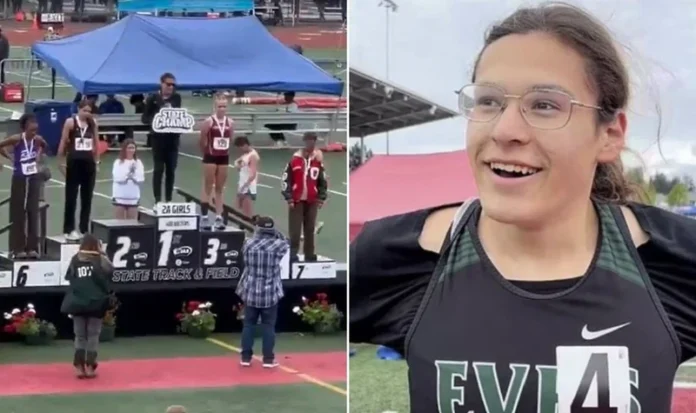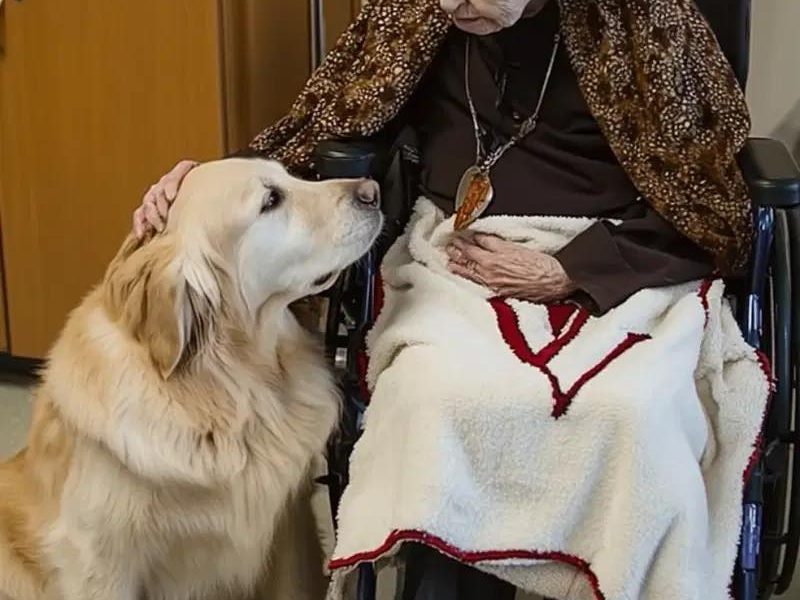For most student athletes, winning a state title is the dream.
But for 17-year-old Verónica Garcia, a transgender high school track star from Washington, crossing the finish line first in the 400-meter dash meant something very different.
Cheers were few. Boos filled the air. And the celebration that should’ve followed her state championship win turned into a national flashpoint in one of the most heated debates in sports today.
Back-to-Back Wins, Back-to-Back Controversy
Verónica secured the top spot in the Class 2A 400-meter dash at the Washington State Track and Field Championships—for the second year in a row.
She clocked in at 55.70 seconds, a time that left her ahead of the field and standing once again atop the podium.
But just like last year, the moment was marred by backlash. Spectators booed loudly during the medal ceremony. Some wore T-shirts with the phrase “Save Women’s Sports”. Others shouted in support of other runners, clearly directing their disapproval toward Verónica.
Verónica Garcia Responds: “I’m Not Giving Up”
Despite the jeers and hostile energy around her, Verónica held her ground.
In an interview with the Seattle Times, she opened up about how she handled the backlash.
“I’ll be honest, I kind of expect it,” she said. “But it maybe didn’t have their intended effect. It made me angry, but not angry as in I wanted to give up, but angry as in I’m going to push.”
It wasn’t just about the race anymore.
Verónica said she draws strength from civil rights icons like Martin Luther King Jr., who believed in doing the right thing—even when the cost was high.
“One of the things that Martin Luther King always pointed out is that you have to do what’s right,” she added. “Even if there comes risk, you still have to do what’s right.”
The Reaction From Fellow Athletes: Divided and Emotional
Not everyone in the race saw it that way.
Second-place finisher Lauren Matthew didn’t hold back when asked how she felt.
“I shouldn’t have to push myself to the point of where I’m about to, like, die in order to win,” she said. “I know I’m gonna push myself to keep going, but I don’t want a man pushing me to have to go.”
Lauren’s comments reflect a broader concern voiced by many critics: that biological differences give transgender women an unfair advantage, even after hormone therapy.
Her words, and the crowd’s reaction, underscore how divided even young athletes and their families are about the fairness of the competition.
The Science and the Debate
At the heart of this issue lies a complex mix of biology, fairness, identity, and policy.
Advocates for transgender inclusion argue that gender identity should guide participation—and that trans athletes face enough discrimination without being excluded from the sports they love.
Opponents argue that biology still plays a significant role, especially in speed and strength-based sports. Even with hormone therapy, they say, trans girls may retain physical advantages, particularly in events like sprinting or throwing.
There is no easy answer.
Different states and athletic associations have adopted varying guidelines. Some require hormone treatment for a set number of years before competition. Others allow trans athletes to compete based on their gender identity without restrictions.
Washington is among the more inclusive states, allowing transgender students to compete in alignment with their gender identity. But that inclusion comes with public scrutiny, as Verónica’s story shows.
A Spotlight No Teen Should Have to Face
For Verónica, being a top athlete means more than training hard—it means being at the center of a cultural storm.
She’s still a teenager.
And yet, at an age when most kids are learning who they are, Verónica is fielding questions from journalists, hearing boos from bleachers, and dealing with adults who question whether she should even be allowed to compete.
It’s a lot.
Still, she seems determined not to be silenced—or stopped.
What Her Win Means, and What’s Next

Whether people agree with her presence on the track or not, Verónica’s performance is undeniable. A 55.70 in the 400 meters is fast, especially at the high school level.
But for many, the controversy isn’t about her time—it’s about her identity.
Her win has reignited national conversation, appearing on conservative news sites, social media platforms, and in comment sections filled with both praise and outrage.
Parents, athletes, coaches, and lawmakers continue to wrestle with the question: How do we create a sports system that is fair, inclusive, and respectful to all?
Looking Beyond the Track
Verónica’s situation mirrors that of other transgender athletes across the country—like Lia Thomas, the swimmer who dominated headlines in 2022, or CeCé Telfer, the NCAA champion in track.
Each victory by a transgender athlete brings new headlines, louder debates, and more pressure on schools and sports organizations to clarify their rules.
Some states have introduced legislation banning transgender athletes from participating in girls’ and women’s sports altogether. Others have doubled down on inclusivity.
The patchwork of policies reflects how deeply divided America remains on the issue.
A Question That Won’t Go Away
At its core, this isn’t just about track. It’s about how society defines fairness, how we balance inclusion with competition, and what we believe sports should represent.
Should gender identity determine where someone competes?
Should biology?
Should it be decided on a case-by-case basis?
These are the questions policymakers, educators, and athletic bodies will continue to wrestle with—and Verónica Garcia, for better or worse, has become one of the faces of that conversation.
Courage, Criticism, and Change
Regardless of where you stand on the issue, one thing is clear: Verónica Garcia isn’t backing down.
She’s choosing to show up, run her race, and own her identity in a world that hasn’t made it easy.
And for that, whether you see her as a champion or a challenger to the status quo, she’s part of a movement that’s reshaping modern sports.
The outcome of this cultural battle isn’t just about a single gold medal—it’s about who gets to compete, who decides the rules, and how we treat each other in the process.


